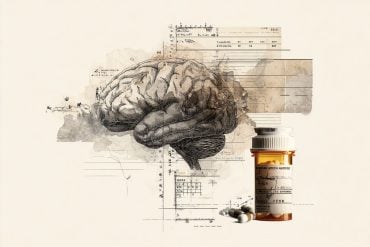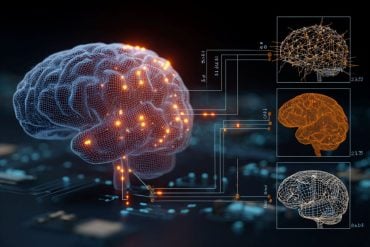Summary: Orienting and executive inhibition, two key brain functions associated with attending to new information and focusing on important aspects of a situation, can improve in older individuals. These functions underlie aspects of cognition, including memory and decision making, and even navigation, math, and language.
Source: Georgetown University Medical Center
It’s long been believed that advancing age leads to broad declines in our mental abilities. Now new research from Georgetown University Medical Center offers surprisingly good news by countering this view.
The findings, published August 19, 2021, in Nature Human Behaviour, show that two key brain functions, which allow us to attend to new information and to focus on what’s important in a given situation, can in fact improve in older individuals. These functions underlie critical aspects of cognition such as memory, decision making, and self-control, and even navigation, math, language, and reading.
“These results are amazing, and have important consequences for how we should view aging,” says the study’s senior investigator, Michael T. Ullman, PhD, a professor in the Department of Neuroscience, and Director of Georgetown’s Brain and Language Lab.
“People have widely assumed that attention and executive functions decline with age, despite intriguing hints from some smaller-scale studies that raised questions about these assumptions,” he says. “But the results from our large study indicate that critical elements of these abilities actually improve during aging, likely because we simply practice these skills throughout our life.”
“This is all the more important because of the rapidly aging population, both in the US and around the world,” Ullman says. He adds that with further research, it may be possible to deliberately improve these skills as protection against brain decline in healthy aging and disorders.
The research team, which includes first author João Veríssimo, PhD, an assistant professor at the University of Lisbon, Portugal, looked at three separate components of attention and executive function in a group of 702 participants aged 58 to 98. They focused on these ages since this is when cognition often changes the most during aging.
The components they studied are the brain networks involved in alerting, orienting, and executive inhibition. Each has different characteristics and relies on different brain areas and different neurochemicals and genes. Therefore, Ullman and Veríssimo reasoned, the networks may also show different aging patterns.
Alerting is characterized by a state of enhanced vigilance and preparedness in order to respond to incoming information. Orienting involves shifting brain resources to a particular location in space. The executive network inhibits distracting or conflicting information, allowing us to focus on what’s important.
“We use all three processes constantly,” Veríssimo explains. “For example, when you are driving a car, alerting is your increased preparedness when you approach an intersection. Orienting occurs when you shift your attention to an unexpected movement, such as a pedestrian. And executive function allows you to inhibit distractions such as birds or billboards so you can stay focused on driving.”
The study found that only alerting abilities declined with age. In contrast, both orienting and executive inhibition actually improved.
The researchers hypothesize that because orienting and inhibition are simply skills that allow people to selectively attend to objects, these skills can improve with lifelong practice. The gains from this practice can be large enough to outweigh the underlying neural declines, Ullman and Veríssimo suggest. In contrast, they believe that alerting declines because this basic state of vigilance and preparedness cannot improve with practice.

“Because of the relatively large number of participants, and because we ruled out numerous alternative explanations, the findings should be reliable and so may apply quite broadly,” Veríssimo says. Moreover, he explains that “because orienting and inhibitory skills underlie numerous behaviors, the results have wide-ranging implications.”
“The findings not only change our view of how aging affects the mind, but may also lead to clinical improvements, including for patients with aging disorders such as Alzheimer’s disease,” says Ullman.
Ullman and Veríssimo report having no personal financial interests related to the study.
In addition to Ullman and Veríssimo, the authors include Paul Verhaeghen, Georgia Institute of Technology; Noreen Goldman, Princeton University; and Maxine Weinstein, Georgetown University.
Funding: This work was supported by the National Institutes of Health (R01 AG016790, R01 AG016661); the National Science Foundation (BCS 1940980); the Deutsche Forschungsgemeinschaft; and the Georgetown Graduate School of Arts and Sciences.
About this aging and cognition research news
Author: Karen Teber
Source: Georgetown University Medical Center
Contact: Karen Teber – Georgetown University Medical Center
Image: The image is in the public domain
Original Research: Closed access.
“Evidence that ageing yields improvements as well as declines across attention and executive functions” by John Verssimo, Paul Verhaeghen, Noreen Goldman, Maxine Weinstein & Michael T. Ullman. Nature Human Behavior
Abstract
Evidence that ageing yields improvements as well as declines across attention and executive functions
Many but not all cognitive abilities decline during ageing. Some even improve due to lifelong experience. The critical capacities of attention and executive functions have been widely posited to decline.
However, these capacities are composed of multiple components, so multifaceted ageing outcomes might be expected. Indeed, prior findings suggest that whereas certain attention/executive functions clearly decline, others do not, with hints that some might even improve.
We tested ageing effects on the alerting, orienting and executive (inhibitory) networks posited by Posner and Petersen’s influential theory of attention, in a cross-sectional study of a large sample (N = 702) of participants aged 58–98. Linear and nonlinear analyses revealed that whereas the efficiency of the alerting network decreased with age, orienting and executive inhibitory efficiency increased, at least until the mid-to-late 70s. Sensitivity analyses indicated that the patterns were robust.
The results suggest variability in age-related changes across attention/executive functions, with some declining while others improve.







